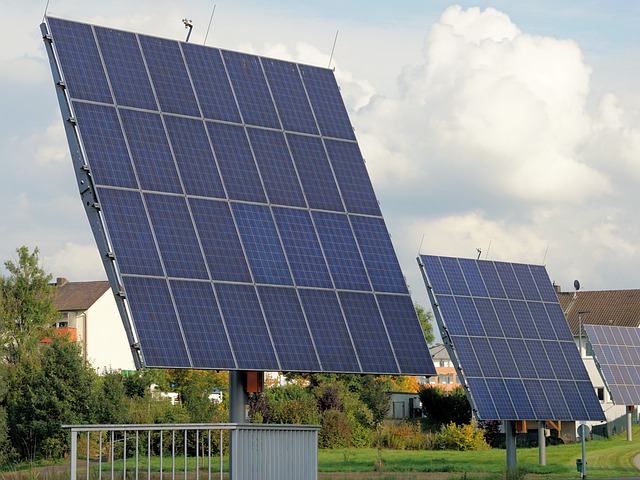Solar power, combined with net metering, is a sustainable and cost-effective energy solution for households and businesses. This setup allows users to generate electricity during daylight, reduce reliance on traditional power sources, and potentially eliminate utility bills. When solar panels produce more energy than needed, the excess can be fed into the grid in exchange for credits at retail rates, which can be used when solar generation is low, like at night. Net metering thus supports energy independence and optimizes returns on solar investments by managing energy costs effectively. It also contributes to a more resilient and sustainable local power grid. For those with solar panels, understanding how to maximize this system through proper installation, maintenance, and energy management is crucial for reaping the full benefits of clean, renewable energy. By analyzing individual energy profiles and solar potential, along with implementing energy-efficient practices and smart energy systems, users can enhance savings and significantly reduce their carbon footprint, making solar power a wise investment for a sustainable future.
solar power’s pivotal role in shaping sustainable energy futures is undeniable. This article delves into the intricacies of net metering services, a critical component in optimizing household energy use. By exploring ‘Maximizing Efficiency with Solar Power and Net Metering: A Guide for Energy-Conscious Households,’ readers will gain clarity on the workings of net metering within ‘Understanding Net Metering: How It Works and Its Role in Sustainable Energy Management.’ Furthermore, ‘Strategies for Optimizing Energy Use with Net Metering and Solar Panels: Best Practices and Tips’ offers practical guidance to harness solar power effectively. Embrace the potential of solar energy and net metering to foster a greener, more sustainable environment.
- Maximizing Efficiency with Solar Power and Net Metering: A Guide for Energy-Conscious Households
- Understanding Net Metering: How It Works and Its Role in Sustainable Energy Management
- Strategies for Optimizing Energy Use with Net Metering and Solar Panels: Best Practices and Tips
Maximizing Efficiency with Solar Power and Net Metering: A Guide for Energy-Conscious Households

Households looking to maximize efficiency with solar power have a valuable ally in net metering services. Solar power represents a transformative shift for energy-conscious consumers, offering both environmental and economic benefits. By harnessing the sun’s energy, homes can generate clean, renewable electricity during daylight hours, reducing reliance on conventional grid power and lowering electricity bills. Net metering complements this by allowing homeowners to send excess solar power back to the grid. This bi-directional flow ensures that when a household produces more power than it consumes, the surplus is credited to the consumer, often at retail rates. This credit can then be used to offset energy use during times when solar generation is insufficient, such as at night or on cloudy days. Understanding and utilizing net metering effectively is crucial for households aiming to achieve energy self-sufficiency and optimize their investment in solar technology. It’s a strategic move for those who want to minimize their environmental footprint while also managing their energy costs more predictably. By leveraging the full potential of solar power in tandem with net metering, energy-conscious households can significantly increase their energy independence and contribute positively to the local grid’s stability and sustainability.
Understanding Net Metering: How It Works and Its Role in Sustainable Energy Management

Net metering is a pivotal mechanism in the realm of sustainable energy management, particularly when it comes to harnessing solar power. It allows homeowners and businesses with solar panels to feed excess electricity generated by their renewable sources back into the grid. When the solar array produces more power than is needed on-site, the surplus energy is sent to the electrical grid. The utility company then credits the user for this clean energy contribution at a retail rate, which can offset the cost of electricity during times when the panels are not producing enough power or at night. This two-way flow of energy ensures that users receive fair compensation for their contributions to the grid, incentivizing investment in solar technology and promoting a more sustainable energy ecosystem.
Moreover, net metering plays a crucial role in optimizing energy use by allowing users to ‘bank’ excess energy during periods of low demand, which can be drawn upon when consumption is higher or at times when the solar panels are not operational. This system facilitates a smoother integration of intermittent renewable sources into the existing power grid, enhancing its reliability and resilience while promoting cleaner energy production. By enabling users to reduce their reliance on non-renewable energy sources, net metering is a key component in the global transition towards sustainable energy management, making it an essential feature for those interested in leveraging solar power to its fullest potential.
Strategies for Optimizing Energy Use with Net Metering and Solar Panels: Best Practices and Tips

Harnessing solar power through net metering services is a strategic move for optimizing energy use in both residential and commercial settings. By installing solar panels, consumers generate electricity during daylight hours, often surplus to their immediate needs. Net metering policies enable these excess energy credits to be banked for later use or compensated by utility companies. To maximize the benefits of net metering, it’s crucial to carefully assess your energy consumption patterns and the potential solar energy generation capacity of your location. This involves selecting an appropriate size and number of panels to meet your annual electricity requirements, considering factors such as local weather conditions, roof orientation, and shading effects.
For optimal performance, regularly monitoring and maintaining your solar panel system is essential. This includes periodic checks of the inverter, wiring, and physical condition of the panels themselves. Efficient energy use also extends beyond the installation of solar panels; it encompasses adopting energy-saving practices within the household or business. Implementing smart energy management systems can further enhance savings by automating the distribution of solar power during peak generation times and adjusting to your usage patterns, thereby ensuring that your investment in solar panels and net metering is as cost-effective and environmentally friendly as possible. Embracing these best practices not only contributes to energy independence but also significantly reduces electricity bills and carbon footprint.
householders can significantly enhance their energy efficiency and sustainability efforts by leveraging solar power in conjunction with net metering services. This article has elucidated the mechanics of net metering, its pivotal role in managing energy consumption responsibly, and the best strategies to maximize benefits from this system. By adopting the practices outlined, consumers can not only reduce their carbon footprint but also potentially lower their utility bills. The integration of solar power technology with net metering is a forward-thinking approach that underscores a commitment to renewable energy sources and sustainable living practices. As more communities adopt these measures, the collective impact on the environment and energy independence can be profound. Homeowners are encouraged to explore the options available to them and take advantage of the myriad benefits associated with solar power and net metering.
